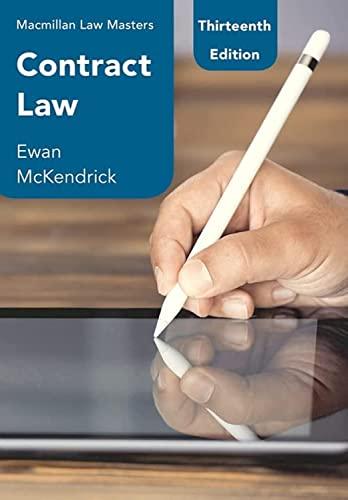Question
Late in the afternoon on 1 December 2018 Alex Demetriou, who owns a waste removal business, collects a truckload of contaminated soil from excavations at
Late in the afternoon on 1 December 2018 Alex Demetriou, who owns a waste removal business, collects a truckload of contaminated soil from excavations at a building site in Melville. He drives the full truck back to his company's yard in Belmont. He leaves it parked there overnight, intending to drive it to a remote dump the next day.
A municipal inspector sees the truck in the yard and discovers that the soil in the truck is contaminated by toxic waste. The inspector tells Alex that the law forbids storing such materials near a river or river bed without a special permit.
Alex admits:
(i) that the soil is contaminated; and
(ii) that he cannot produce a permit.
The Swan River is three kilometres from the haulage company's yard.
The inspector makes a report to the WA Police, who charge Alex with a breach of s 3 of an Act called the Contamination Avoidance Act.Alex is given the option of admitting guilt and paying a fine of $1,000.Otherwise, he will have to defend the charge in court.
Alex comes to you for advice. He admits the soil was left in the yard, but says it was only left there overnight and that he always intended to move it the next day. He says that, in these circumstances, he does not think he contravened the Act. Alex wants to know whether he should pay the $1,000 fine or defend the charge in court.
You search the Austlii databases and find the Contamination Avoidance Act 2008 (WA). The Act contains provisions dealing with various environmental issues. The relevant sections of the Act are set out below. Before proceeding further with this Tutorial Exercise question please carefully read those sections and the 'Additional Information' that appears immediately below them:
Contamination Avoidance Act 2008 (WA)
In the name and on behalf of Her Majesty I, Kenneth Comninos Michael, Governor of Western Australia, hereby assent to this Bill
Date of Assent: 30th July 2008
Kenneth Comninos Michael
--------------------------------------------------------------------
1.Objects.
The objects of this Act are:
(a) to protect the water resources of Western Australia; and
(b) to prevent harm caused by the accidental spread of contaminants.
2.Definitions
For the purposes of this Act
(a) "Minister" means the Minister of Environmental Affairs.
(b) "river bed" means a river with intermittent flow
(c) "toxic materials" means any materials that are contaminated with or that contain substances known to cause harm to animals or plants.
3.Storage of toxic materials prohibited
A person shall not store or permit the storage of toxic materials within five kilometres of a river or river bed without first obtaining a permit from the Minister.
4. Permits
An application for a permit to store toxic waste must be made on the prescribed form at least three weeks before the intended storage takes place.
5. Offences and Penalties
Any person who engages in conduct in contravention of this Act, or who causes another person to engage in conduct in contravention of this Act, shall be guilty of an offence and liable to a fine not exceeding $5,000.
Additional Information
In addition to locating the above Act you discover, in the course of your research, that when the Bill for this Act was introduced into the WA Parliament the Minister of Environmental Affairs said, in the course of her Second Reading Speech:
"... The Contamination Avoidance Act will ensure that there is no risk at all of contamination to our precious waterways due to toxic material being left in any circumstances within the prescribed areas..."
Now, before deciding how you would wish to advise Alex carefully consider the following questions:
1.Does this Act actually apply to the case in question?
2.Has it commenced operation?
3.What facts and elements must be proved to establish a breach of section 3?
4.Is there evidence sufficient to prove each necessary fact and element?
5.On the known facts, what argument is Alex making in his defence?
6.Is he suggesting that leaving the soil in the truck overnight does not constitute 'storing' that material?
7.Does Alex's argument raise an interpretation question?
8.If so, what is the proper approach to the resolution of that question?
9.What conclusion is a court likely to reach in this case and why?
Now consider 'the ultimate question':
10. Should Alex pay the $1,000 fine or defend the charge in court?
(Having followed all of the above instructions, and worked out what you think the answer to 'the ultimate question' should be, write up a paragraph of not more than in which you concisely state your conclusion to the above question.)
Step by Step Solution
There are 3 Steps involved in it
Step: 1

Get Instant Access to Expert-Tailored Solutions
See step-by-step solutions with expert insights and AI powered tools for academic success
Step: 2

Step: 3

Ace Your Homework with AI
Get the answers you need in no time with our AI-driven, step-by-step assistance
Get Started


